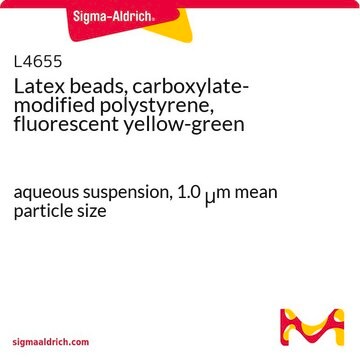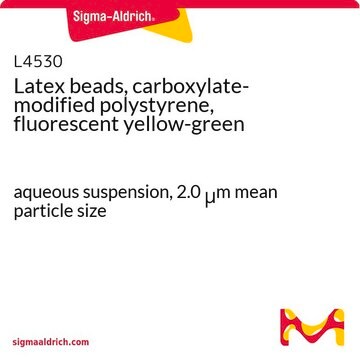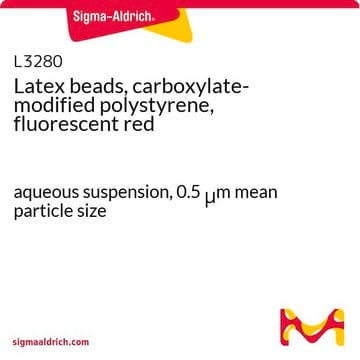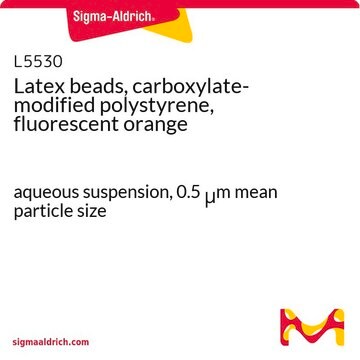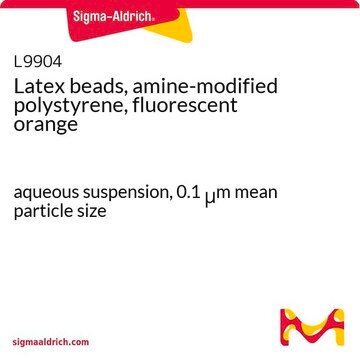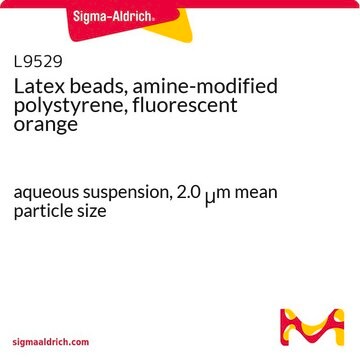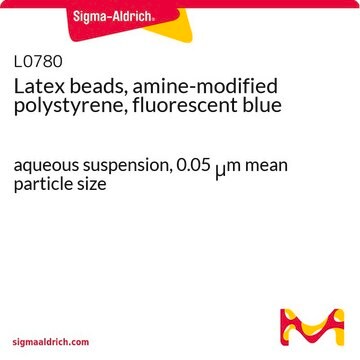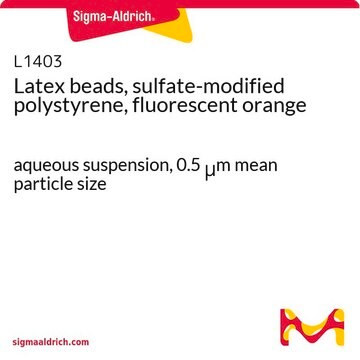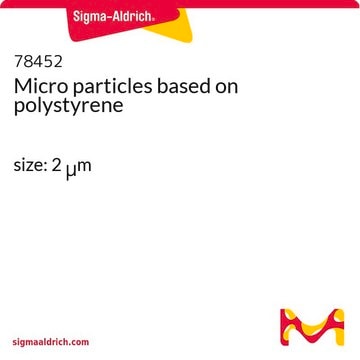L3030
Latex beads, carboxylate-modified polystyrene, fluorescent red
aqueous suspension, 2.0 μm mean particle size
Synonym(s):
Fluorescent latex beads
Sign Into View Organizational & Contract Pricing
All Photos(1)
About This Item
Recommended Products
form
aqueous suspension
contains
0.1% NaN3
composition
Solids, 2.5%
technique(s)
cell based assay: suitable
mean particle size
2.0 μm
fluorescence
λex ~575 nm; λem ~610 nm
application(s)
cell analysis
Looking for similar products? Visit Product Comparison Guide
Application
Carboxylate-modified polystyrene latex beads have been used to collect morphofunctional data about the immune systems of Carabus lefebvrei, a helicophagous Italian endemic ground beetle often used as an indicator of the habitat quality of the Apennines mountain forests. Carboxylate-modified polystyrene latex beads have also been used to inform comparative studies on immunity defense mechanisms of adults and larvae of the coleopteran Cetonischema aeruginosa and to investigate the phagocytic activity of cultured rat thyroid cells.
Storage Class Code
10 - Combustible liquids
WGK
WGK 2
Flash Point(F)
Not applicable
Flash Point(C)
Not applicable
Certificates of Analysis (COA)
Search for Certificates of Analysis (COA) by entering the products Lot/Batch Number. Lot and Batch Numbers can be found on a product’s label following the words ‘Lot’ or ‘Batch’.
Already Own This Product?
Find documentation for the products that you have recently purchased in the Document Library.
Customers Also Viewed
Kun Qin et al.
Cellular and molecular neurobiology, 32(1), 67-75 (2011-08-13)
Microglia, implicating in such neuro-pathologies as brain inflammation, neurodegeneration, glioma, and neurogenesis, play an important role in central nervous system. Advanced research on microglia is crucial in exploring the neuro-pathology and neuro-physiology of these diseases, so how to culture large
Marc Daigneault et al.
PloS one, 5(1), e8668-e8668 (2010-01-20)
Differentiated macrophages are the resident tissue phagocytes and sentinel cells of the innate immune response. The phenotype of mature tissue macrophages represents the composite of environmental and differentiation-dependent imprinting. Phorbol-12-myristate-13-acetate (PMA) and 1,25-dihydroxyvitamin D3 (VD(3)) are stimuli commonly used to
Florence Defresne et al.
Cancer research, 71(14), 4748-4757 (2011-05-28)
Tumor progression is associated with the release of signaling substances from the primary tumor into the bloodstream. Tumor-derived cytokines are known to promote the mobilization and the recruitment of cells from the bone marrow, including endothelial progenitor cells (EPC). Here
Yuichi Kanehiro et al.
Frontiers in microbiology, 9, 1517-1517 (2018-07-28)
Protein kinase G (PknG) is a eukaryotic-like serine/threonine kinase that is expressed by Mycobacterium tuberculosis and promotes survival of mycobacteria in host macrophages by suppressing phagosome-lysosome fusion. Thus, compounds showing inhibitory activity against PknG are promising anti-mycobacterial agents. We therefore
Je-In Youn et al.
Journal of leukocyte biology, 91(1), 167-181 (2011-09-29)
MDSCs are a group of cells with potent immune-suppressive activity. These cells accumulate in many pathologic conditions and play a major role in the regulation of immune responses. The nature of MDSC remains highly debatable. In cancer, most MDSCs are
Our team of scientists has experience in all areas of research including Life Science, Material Science, Chemical Synthesis, Chromatography, Analytical and many others.
Contact Technical Service